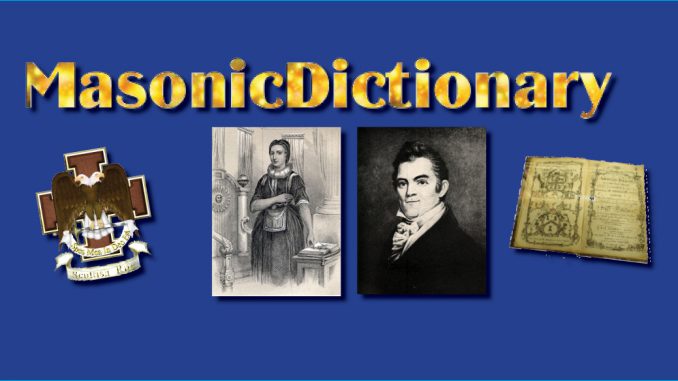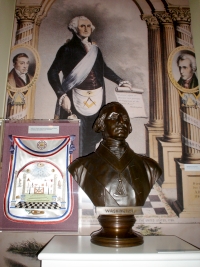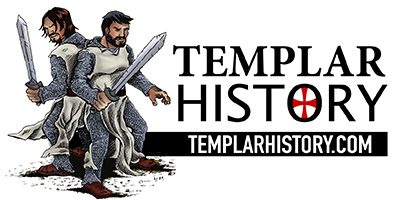
 Two aprons of a Masonic and historic character were owned by General George Washington. One of these was brought to this country by our Masonic Brother, the Marquis de Lafayette, in 1784.
Two aprons of a Masonic and historic character were owned by General George Washington. One of these was brought to this country by our Masonic Brother, the Marquis de Lafayette, in 1784.
An object of his visit was to present to General Washington a beautiful white satin apron bearing the National colors, red, white and blue, and embroidered elaborately with Masonic emblems, the whole being the handiwork of Madame la Marquise de Lafayette.
This apron, according to Brother Julius F. Sachse in his book, History of Brother General Lafayette’s Fraternal Connections with the Grand Lodge of Pennsylvania (page 5), was enclosed in a handsome rosewood box when presented to Brother George Washington.
Another apron was presented to General Washington. This gift was also made in France and the similarity of purpose and of origin has caused some confusion as to the identity of the two aprons that happily were preserved and proudly cherished by their later owners after the death of Brother Washington.
The gift of the second apron was due to the fraternal generosity of Brother Elkanah Watson and his partner, M. Cassoul, of Nantes, France. The name Cassoul in the old records is also spelled Cossouland Cosson. Watson and Cassoulacted as confidential agents abroad for the American Government during the revolutionary period, the former being also a bearer of dispatches to Dr. Benjamin Franklin.
Brother Sachse, in the above-mentioned work, quotes Brother Watson from a book Men and Times of the Revolution, or Memoirs of Elkanah Watson, (New York, 1856, pages 135-6), as follows: “Wishing to pay some mark of respect to our beloved Washington, I employed, in conjunction with my friend M. Cossoul, nuns in one of the convents at Nantes to prepare some elegant Masonic ornaments and gave them a plan for combining the American and French flags on the apron designed for this use.
They were executed in a superior and expensive style. We transmitted them to America, accompanied by an appropriate address.”
An autograph reply to the address was written by Brother Washington and this letter was purchased from the Watson family and thus came into the possession of the Grand Lodge of New York.
The Washington apron owned by the Grand Lodge of Pennsylvania was first given by the legatees of Brother George Washington to the Washington Benevolent Society on October 26, 1816, and was presented to the Grand Lodge on July 3, 1829.
The other Washington apron and sash came into the possession of Alexandria Washington Lodge No. 22, at Alexandria, Virginia, on June 3, 1812, and as recorded in the Lodge of Washington (page 90), were presented, with the box made in France which contained them, by Major Lawrence Lewis, a nephew of Washington, on behalf of his son, Master Lorenzo Lewis. The pamphlet, George Washington the Man and the Mason, prepared by the Research Committee, Brother C. C. Hunt, Chairman, of the Grand Lodge of Iowa, 1921, raises the question as to the number of degrees conferred upon Brother Washington.
Fredericksburg Lodge No. 4, Fredericksburg, Virginia, where Brother Washington received his Masonic Degrees, conferred the Royal Arch Degree under the authority of its Lodge Warrant. In fact, the first known record of this degree being conferred anywhere is in the Minutes of this Lodge under date of December 22, 1753.
There is a reference to the degree by the Grand Committee of the Ancient, September 2, 1752, and the books of Vernon Lodge, No. 123, Coleraine in Ireland, show that “a Master and Royal Arch Mason” was proposed for membership, April 16, 1752, and also that a Royal Arch reception was held on March 11, 1745 (see Miscellanea Latomorum, volume ix, page 138). On the flap of the apron presented to Washington are the familiar letters H T W S S T K S arranged in the usual circular form. Within the circle is a beehive which may indicate the Mark selected by the wearer.
The above pamphlet points out that as this apron was made especially for Washington it is probable that he was a Mark Master Mason at least, and that it is not likely that this emblem would have been placed on the apron had the facts been otherwise. Certainly the beehive as an emblem of industry was an appropriate Mark for Washington to select.
– Source: Mackey’s Encyclopedia of Freemasonry
